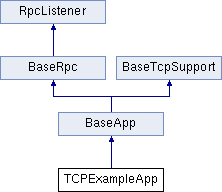Additional Inherited Members |
| enum | EvCode {
NO_EST_CONNECTION,
PEER_CLOSED,
PEER_TIMEDOUT,
PEER_REFUSED,
CONNECTION_RESET,
CONNECTION_SUCC_ClOSED
} |
| int | numInitStages () const |
| | method to set InitStage
|
| void | initialize (int stage) |
| | initializes base class-attributes
|
| virtual void | initializeApp (int stage) |
| | initializes derived class-attributes
|
| void | handleMessage (cMessage *msg) |
| | checks for message type and calls corresponding method
|
| virtual void | receiveChangeNotification (int category, const cPolymorphic *details) |
| | callback-method for events at the NotificationBoard
|
| virtual void | handleTransportAddressChangedNotification () |
| | This method gets call if the node has a new TransportAddress (IP address) because he changed his access network.
|
| virtual void | handleNodeLeaveNotification () |
| | This method gets call **.gracefulLeaveDelay seconds before it is killed.
|
| virtual void | handleNodeGracefulLeaveNotification () |
| | This method gets call **.gracefulLeaveDelay seconds before it is killed if this node is among the gracefulLeaveProbability nodes.
|
| void | finish () |
| | collects statistical data
|
| virtual void | finishApp () |
| | collects statistical data of derived app
|
| void | callRoute (const OverlayKey &key, cPacket *msg, const TransportAddress &hint=TransportAddress::UNSPECIFIED_NODE, RoutingType routingType=DEFAULT_ROUTING) |
| | Common API function: calls route-method in overlay.
|
| void | callRoute (const OverlayKey &key, cPacket *msg, const std::vector< TransportAddress > &sourceRoute, RoutingType routingType=DEFAULT_ROUTING) |
| virtual void | deliver (OverlayKey &key, cMessage *msg) |
| | Common API function: handles delivered messages from overlay.
|
| virtual void | forward (OverlayKey *key, cPacket **msg, NodeHandle *nextHopNode) |
| | Common API function: handles messages from overlay to be forwarded.
|
| virtual void | update (const NodeHandle &node, bool joined) |
| | Common API function: informs application about neighbors and own nodeID.
|
| NodeVector * | callLocalLookup (const OverlayKey &key, int num, bool safe) |
| | Common API function: produces a list of nodes that can be used as next hops towards key.
|
| NodeVector * | callNeighborSet (int num) |
| | Common API function: produces a list of neighbor nodes.
|
| bool | isSiblingFor (const NodeHandle &node, const OverlayKey &key, int numSiblings, bool *err) |
| | Query if a node is among the siblings for a given key.
|
| virtual void | handleLowerMessage (cMessage *msg) |
| | processes self-messages
|
| virtual void | handleUpperMessage (cMessage *msg) |
| | handleUpperMessage gets called of handleMessage(cMessage* msg) if msg arrivedOn from_upperTier (currently msg gets deleted in this function)
|
| virtual void | handleUDPMessage (cMessage *msg) |
| | method to handle messages that come directly from the UDP gate
|
| virtual void | handleReadyMessage (CompReadyMessage *msg) |
| | method to handle ready messages from the overlay
|
| virtual void | bindToPort (int port) |
| | Tells UDP we want to get all packets arriving on the given port.
|
| virtual void | sendMessageToUDP (const TransportAddress &destAddr, cPacket *msg, simtime_t delay=SIMTIME_ZERO) |
| | Sends a packet over UDP.
|
| virtual void | handleTraceMessage (cMessage *msg) |
| | handleTraceMessage gets called of handleMessage(cMessage* msg) if a message arrives at trace_in.
|
| void | sendMessageToLowerTier (cPacket *msg) |
| | sends non-commonAPI message to the lower tier
|
| bool | internalHandleRpcCall (BaseCallMessage *msg) |
| | Handles internal rpc requests.
|
| void | internalHandleRpcResponse (BaseResponseMessage *msg, cPolymorphic *context, int rpcId, simtime_t rtt) |
| | Handles rpc responses internal in base classes
|
| void | internalSendRouteRpc (BaseRpcMessage *message, const OverlayKey &destKey, const std::vector< TransportAddress > &sourceRoute, RoutingType routingType) |
| virtual CompType | getThisCompType () |
| | Return the component type of this module.
|
| void | sendReadyMessage (bool ready=true, const OverlayKey &nodeId=OverlayKey::UNSPECIFIED_KEY) |
| UnderlayConfigurator * | underlayConfigurator |
| | pointer to UnderlayConfigurator in this node
|
| GlobalNodeList * | globalNodeList |
| | pointer to GlobalNodeList in this node
|
| GlobalStatistics * | globalStatistics |
| | pointer to GlobalStatistics module in this node
|
| NotificationBoard * | notificationBoard |
| | pointer to NotificationBoard in this node
|
| bool | debugOutput |
| | debug output yes/no?
|
| int | numOverlaySent |
| | number of sent packets to overlay
|
| int | bytesOverlaySent |
| | number of sent bytes to overlay
|
| int | numOverlayReceived |
| | number of received packets from overlay
|
| int | bytesOverlayReceived |
| | number of received bytes from overlay
|
| int | numUdpSent |
| | number of sent packets to UDP
|
| int | bytesUdpSent |
| | number of sent bytes to UDP
|
| int | numUdpReceived |
| | number of received packets from UDP
|
| int | bytesUdpReceived |
| | number of received bytes from UDP
|
| simtime_t | creationTime |
| | simTime when the App has been created
|
A simple TCP example application.
This is a simple TCP example application. It periodically establishes TCP connections to random nodes, sends PING and receives PONG messages.
- Author
- Antonio Zea
-
Bernhard Mueller
-
Ingmar Baumgart
Definition at line 43 of file TCPExampleApp.h.

 Public Member Functions inherited from BaseApp
Public Member Functions inherited from BaseApp Public Member Functions inherited from BaseRpc
Public Member Functions inherited from BaseRpc Public Member Functions inherited from RpcListener
Public Member Functions inherited from RpcListener Public Member Functions inherited from BaseTcpSupport
Public Member Functions inherited from BaseTcpSupport Public Types inherited from BaseTcpSupport
Public Types inherited from BaseTcpSupport Protected Member Functions inherited from BaseApp
Protected Member Functions inherited from BaseApp Protected Attributes inherited from BaseApp
Protected Attributes inherited from BaseApp